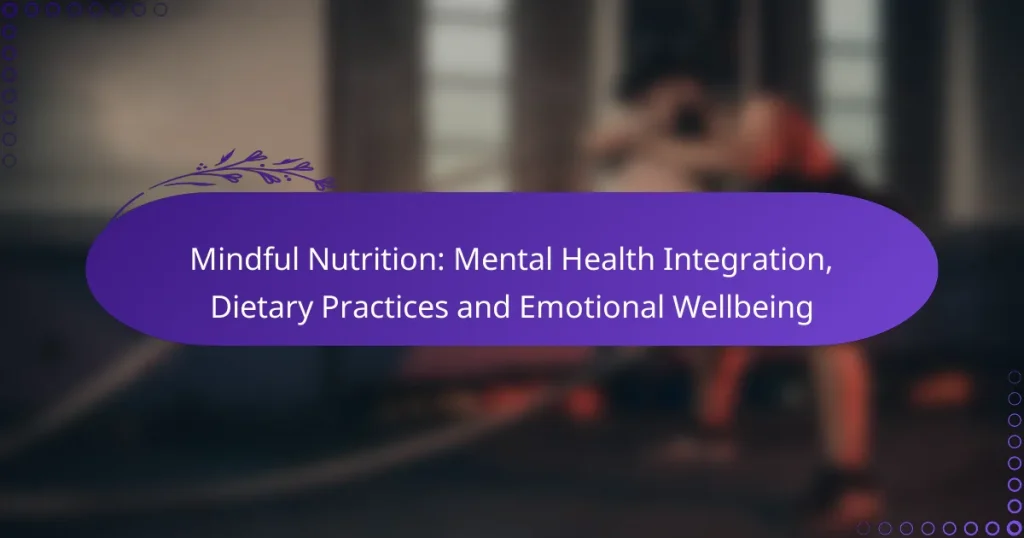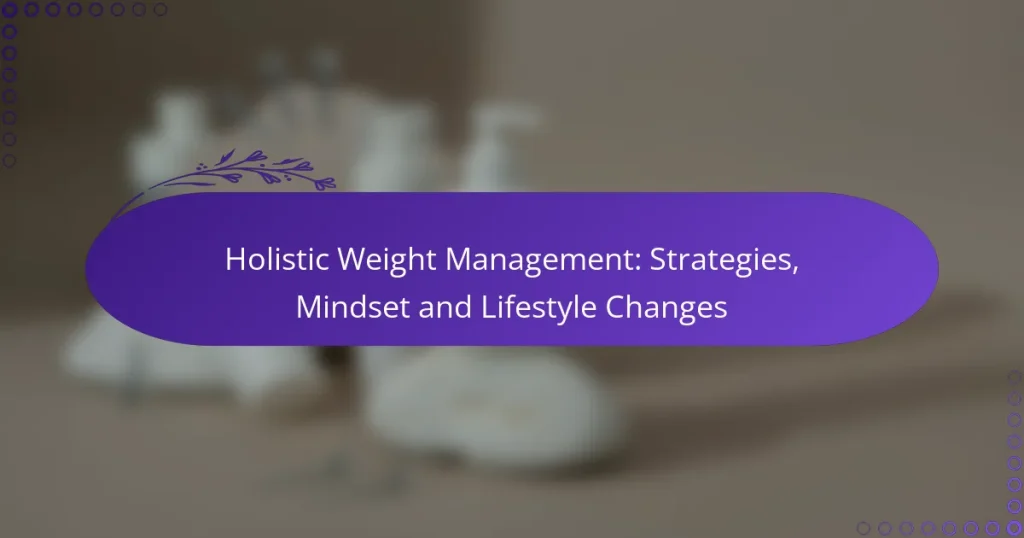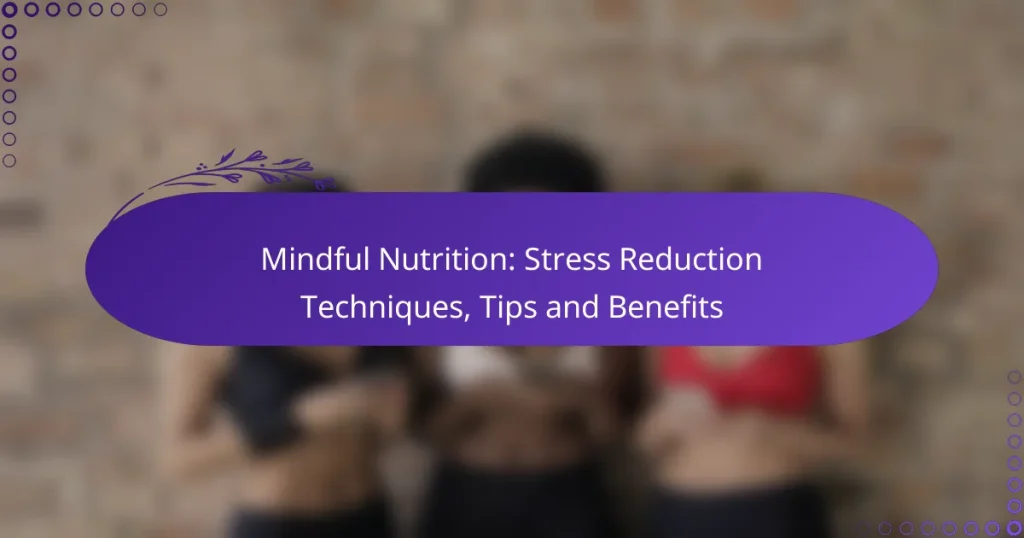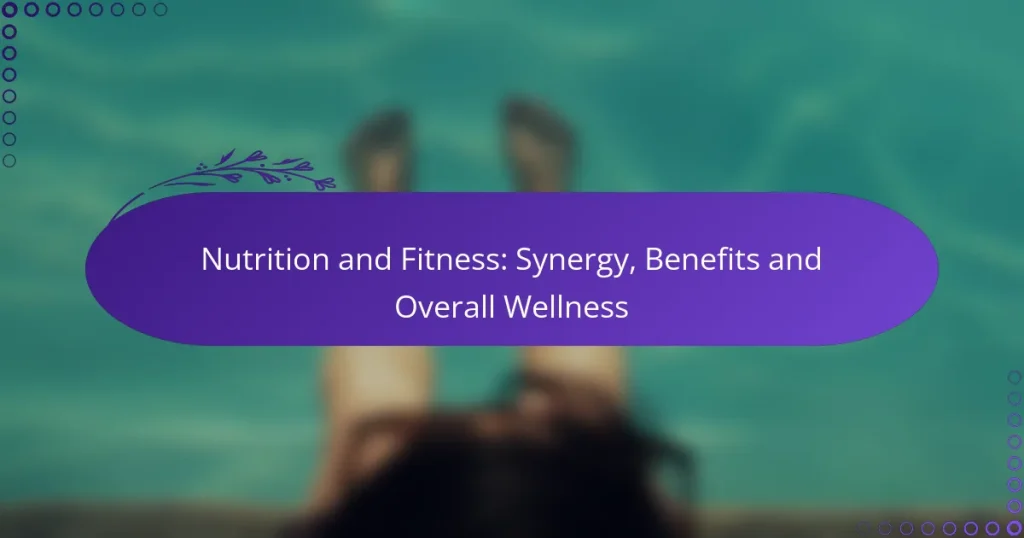Mindful nutrition and fitness plans emphasize a holistic approach to health by encouraging awareness of food choices and physical activity. By integrating intentional eating habits with tailored workout routines, individuals can achieve improved mental clarity and overall well-being. This mindful practice fosters a balanced lifestyle, allowing for a deeper connection to both nutrition and fitness.
Nutrition and Fitness: Sleep’s Role, Impact and Success Factors
Holistic Weight Management: Strategies, Mindset and Lifestyle Changes
Balanced Wellness Routine: Nutrition, Fitness and Health Optimization
Mindful Nutrition: Stress Reduction Techniques, Tips and Benefits
Nutrition and Fitness: Synergy, Benefits and Overall Wellness
Traditional vs. Holistic Health: Approaches, Benefits and Limitations
What are effective mindful nutrition strategies in Los Angeles?
Effective mindful nutrition strategies in Los Angeles focus on awareness of food choices, portion sizes, and the overall eating experience. By incorporating local resources and practices, individuals can enhance their health and well-being through intentional eating habits.
Plant-based meal planning
Plant-based meal planning emphasizes the inclusion of fruits, vegetables, whole grains, and legumes while minimizing animal products. This approach can help reduce the risk of chronic diseases and promote sustainability. Aim for a variety of colors and textures to ensure a balanced intake of nutrients.
To start, consider creating a weekly meal plan that includes at least three plant-based meals per day. Simple recipes like quinoa bowls, vegetable stir-fries, and lentil soups can be nutritious and satisfying. Keep in mind that local farmers’ markets often offer seasonal produce, making it easier to plan meals around fresh ingredients.
Mindful eating practices
Mindful eating practices involve paying full attention to the eating experience, which can enhance enjoyment and satisfaction. Techniques include eating slowly, savoring each bite, and recognizing hunger and fullness cues. This practice can help prevent overeating and promote a healthier relationship with food.
To implement mindful eating, try setting aside distractions during meals, such as phones or television. Focus on the flavors, textures, and aromas of your food. Additionally, consider using smaller plates to help control portion sizes and encourage mindfulness during meals.
Local organic food sources
Los Angeles offers a wealth of local organic food sources, including farmers’ markets, co-ops, and specialty grocery stores. These venues provide access to fresh, organic produce and other healthful products, supporting both personal health and local agriculture. Shopping locally can also reduce your carbon footprint.
Some popular options include the Hollywood Farmers’ Market and the Santa Monica Farmers Market, which feature a variety of organic fruits, vegetables, and artisanal goods. Joining a community-supported agriculture (CSA) program can also be a convenient way to receive seasonal organic produce directly from local farms.
How can fitness plans be integrated with mindful nutrition?
Fitness plans can be effectively integrated with mindful nutrition by aligning workout routines with dietary choices that support overall health. This approach emphasizes awareness of food intake and physical activity, ensuring that both elements complement each other for optimal wellness.
Holistic workout routines
Holistic workout routines focus on the entire body and mind, incorporating various forms of exercise such as strength training, cardio, flexibility, and mindfulness practices like yoga. These routines promote not just physical fitness but also mental clarity and emotional balance.
When creating a holistic workout plan, consider including activities that you enjoy, as this increases adherence. Aim for a mix of 150 to 300 minutes of moderate-intensity aerobic activity each week, along with muscle-strengthening exercises on two or more days.
Nutrition-focused fitness coaching
Nutrition-focused fitness coaching combines personalized exercise regimens with tailored dietary advice to enhance performance and recovery. Coaches often assess individual dietary habits and physical goals to create a balanced plan that addresses both nutrition and fitness.
When seeking nutrition-focused coaching, look for professionals who can provide guidance on macronutrient ratios, meal timing, and hydration strategies that align with your fitness goals. Avoid common pitfalls like extreme dieting or neglecting essential nutrients, as these can hinder progress.
What are the benefits of mindful nutrition and fitness?
Mindful nutrition and fitness offer numerous benefits, including improved mental clarity and enhanced physical health. By focusing on the present moment and making intentional choices about what to eat and how to exercise, individuals can experience a more balanced and fulfilling lifestyle.
Improved mental well-being
Practicing mindful nutrition and fitness can significantly boost mental well-being. Engaging in activities like yoga or meditation alongside healthy eating fosters a sense of calm and reduces stress. This holistic approach allows individuals to develop a deeper connection with their bodies and emotions.
Consider incorporating mindfulness techniques into daily routines, such as mindful eating, where you savor each bite and pay attention to hunger cues. This practice can lead to better emotional regulation and a more positive outlook on life.
Enhanced physical health
Mindful nutrition and fitness contribute to enhanced physical health by promoting better dietary choices and regular exercise. By being aware of what you consume, you can make healthier decisions that support your body’s needs, leading to improved energy levels and overall vitality.
Incorporate a variety of whole foods into your diet, such as fruits, vegetables, lean proteins, and whole grains. Aim for at least 150 minutes of moderate exercise weekly, which can include activities like brisk walking or cycling, to maintain a healthy weight and improve cardiovascular health.
How to choose a mindful nutrition and fitness program?
Choosing a mindful nutrition and fitness program involves aligning your personal health goals with the right strategies and credentials of the program. Focus on what you want to achieve, whether it’s weight loss, muscle gain, or overall wellness, and ensure the program is backed by qualified professionals.
Assessing personal health goals
Start by clearly defining your health objectives. Consider factors such as your current fitness level, dietary preferences, and any medical conditions. For example, if you’re looking to lose weight, aim for a program that promotes gradual weight loss of about 0.5 to 1 kg per week.
Next, think about your lifestyle and how much time you can realistically dedicate to nutrition and fitness. A program that requires excessive time or resources may not be sustainable. Balance your goals with practical considerations to find a program that fits your life.
Evaluating program credentials
Check the qualifications of the professionals behind the program. Look for certifications from recognized organizations, such as the Academy of Nutrition and Dietetics or the American College of Sports Medicine. This ensures that the guidance you receive is based on sound principles and current research.
Additionally, read reviews and testimonials from past participants. A program with a strong track record and positive feedback can indicate its effectiveness. Be cautious of programs that make unrealistic promises or lack transparency about their methods and results.
What local resources are available for mindful nutrition and fitness?
In Los Angeles, various local resources support mindful nutrition and fitness, including community workshops, fitness studios, and health-focused events. These resources provide opportunities for individuals to engage in holistic health practices that promote well-being.
Community wellness workshops
Community wellness workshops in Los Angeles often focus on nutrition education, mindfulness practices, and fitness techniques. These workshops can vary in length and format, ranging from one-time events to multi-week series, allowing participants to choose what fits their schedules.
Many workshops are offered for free or at a low cost, making them accessible to a wide audience. Look for programs hosted by local health organizations, community centers, or even universities that emphasize a holistic approach to health.
Local fitness studios in Los Angeles
Los Angeles is home to numerous fitness studios that cater to a variety of interests, from yoga and pilates to high-intensity interval training. Many of these studios incorporate mindful movement practices, encouraging participants to connect with their bodies while exercising.
When selecting a fitness studio, consider factors such as class schedules, instructor qualifications, and membership costs. Many studios offer introductory classes or trial memberships, allowing you to explore different options before committing.
What are the costs associated with mindful nutrition and fitness plans?
The costs of mindful nutrition and fitness plans can vary significantly based on individual choices, program types, and local food prices. Generally, budgeting for these plans involves considering both the expenses for professional guidance and the cost of high-quality food options.
Average program pricing
Mindful nutrition and fitness programs often range from a few hundred to several thousand dollars, depending on the comprehensiveness of the plan and the expertise of the providers. For instance, personal training sessions may cost between $50 and $150 per hour, while nutrition coaching can range from $100 to $300 per month.
Many programs offer packages that can reduce the per-session cost, so it’s advisable to compare options. Additionally, some online platforms provide access to meal plans and workout routines for a monthly fee, typically between $10 and $50.
Cost of organic food in Los Angeles
In Los Angeles, the cost of organic food tends to be higher than conventional options, reflecting the city’s focus on health and sustainability. On average, organic fruits and vegetables may cost 20-50% more than their non-organic counterparts. For example, a pound of organic apples can range from $3 to $5, while non-organic apples might be priced around $1 to $3 per pound.
Shopping at local farmers’ markets or joining a community-supported agriculture (CSA) program can help mitigate costs while ensuring access to fresh, organic produce. It’s also beneficial to plan meals around seasonal items, which can be more affordable and nutritious.
How to measure progress in mindful nutrition and fitness?
Measuring progress in mindful nutrition and fitness involves tracking changes in dietary habits and assessing fitness levels over time. This can help identify what works best for your body and guide adjustments to your plans for optimal health.
Tracking dietary changes
To effectively track dietary changes, consider maintaining a food diary or using a nutrition app. Record what you eat, portion sizes, and how you feel after meals to identify patterns and areas for improvement.
Focus on specific metrics such as daily calorie intake, macronutrient ratios, and the variety of foods consumed. Aim for a balanced diet rich in fruits, vegetables, whole grains, and lean proteins, adjusting as needed based on your goals.
Common pitfalls include underestimating portion sizes and neglecting to track snacks. Regularly review your entries to stay accountable and motivated.
Fitness progress assessments
Assessing fitness progress can be done through various methods, including tracking workout frequency, duration, and intensity. Consider using fitness apps or wearable devices to monitor your heart rate, steps, and calories burned during workouts.
Set specific, measurable goals such as increasing your running distance by a certain percentage or improving strength in key exercises. Regularly test your performance, such as timing a mile run or measuring maximum weight lifted, to gauge improvements.
Be mindful of overtraining; ensure you allow adequate recovery time between assessments. Consistency is key, so establish a routine that fits your lifestyle while pushing your limits gradually.






